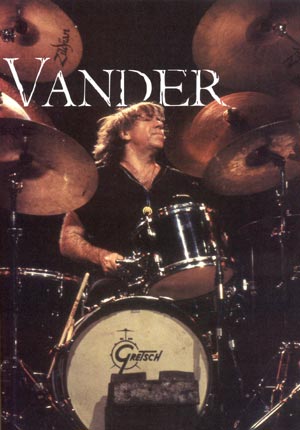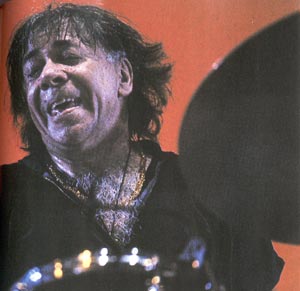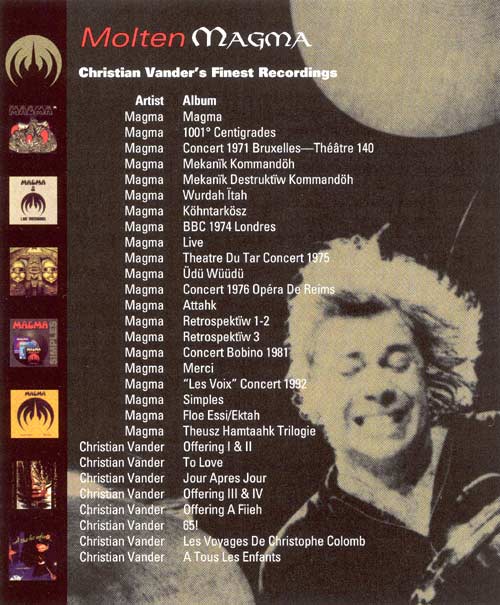
Magma's Christian Vander
Beyond the Bearing Edge
By Morgan Ägren
Translation by Jean-François Devanneaux

Would you think I was kidding if I claimed
that one of the most charismatic musicians I've ever seen is a drummer living
in France, who formed his own band more than thirty years ago? You'd probably
also think I was kidding if I told you this bands sings in their own made-up
language called Kobaïan.
Be that as it may, three years ago I went to Paris to see drummer Christian
Vander performed with his legendary prog-rock-jazz group Magma. They were
celebrating their thirtieth anniversary. I had some tapes of Magma already
from my mid-teens, but I'd never gotten the chance to see them live. This
time, a French friend called me up about the three Magma concerts that were
going to be held in Paris. (I live in Stockholm, Sweden.) It was an event
that I could not miss.
Let me say that I am not a journalist. I make my living as a professional
drummer. But when I went to Paris to see Magma, I was blown away. I was then
lucky enough to meet Christian. After realizing what a special artist he is,
I thought, why not interview him? After seeing him play it would certainly
be fun and interesting to sit down with this legend.
It's hard to describe the sound of Christian Vander and Magma. The mood and
expression he possesses while playing should be seen. To give you a rough
idea, imagine the power of someone like Narada Michael Walden or Terry Bozzio,
but played on Elvin Jone's drumkit. It's intense, loud and sharp. But the
jazz sound of Christian's drums makes it very different too, because drummers
don't normally play like that on a tiny kit with an 18" bass drum. As
for the music of Magma, it sometimes sounds like a cross between Carl Orff's
"Carmina Burana" and the Mahavishnu Orchestra.
As I mentioned earlier, Magma sing in their own language, made up by Christian.
Listening to their music, you'll hear about the planet Kobaïa, Uniweria
Zekt, Zeuhl and Mekanïk Destruktïw Kommandöh. But you don't
have to be interested in this part of the band in order to get a serious kick
out of Christian Vander's drumming - and the music of Magma.
VANDER at a glance
 •
Christian Vander was born on February 21, 1948.
•
Christian Vander was born on February 21, 1948.
• From an early age, his mother introduced him to famous jazzmen such as Elvin Jones and Kenny Clarke. Indeed, Chet Baker gave Vander his first drumkit. He listened to all the greats of jazz, especially John Coltrane, who he had the chance to meet. He also listened to composers such as Wagner, Stravinsky, and Bach, and many R&B and blues bands.
• Vander formed his first group, Les Wurdalaks, in 1966 and wrote his first themes at that time.
• Following the death of John Coltrane in 1967, which had a profound affect on him, Vander left his native France for Italy, where he played in clubs with jazz and R&B groups.
• In 1969 he founded Magma.
• Between 1969 and 1984, about fifty players "trod the boards" with Magma, many of them destined to become musicians of great renown : Didier Lockwood, Jannick Top, Claude Engel, Bernard Paganotti, Yochk'o Seffer, and Teddy Lasry. Magma quickly gained and international reputation, notably following their appearance at the Newport Jazz Festival in 1973, where the band was joined by the Brecker Brothers. More than twenty Magma albums have been released.
• In 1979, Vander formed a parallel, complementary group to Magma, The Alien Quartet, with Benoît Widemann, Patrick Gauthier, Jean-Pierre Fouquey, and Dominique Bertram. This group was followed by The Christian Vander Trio, featuring Michel Graillier and Alby Cullaz. Two Trio albums, Jour après Jour and 65! Were recorded between 1990 and 1993. The Trio continues to appear regularly in France and throughout Europe.
• Between 1992 and 1995, Vander directed the group Les Voix De Magma, comprised of a dozen musicians and singers, largely inspired by the main Magma themes, put a new perspective on the vocal aspect of his compositions.
• The twenty-fifth anniversary of Magma was celebrated in Paris on October 14 and 15, 1995 with a homage to Vander by a one-hundred-thirty-piece children's orchestra and choir, directed by Gaston Tavel. (This memorable event is available on the album Babayaga La Sorcière, When Children Sing Magma.)
• Since 1996, Magma has returned to the stage with a group of talented new musicians playing the mythic work of the '70s to an audience composed mainly of young people.
MD: How and when did this vision of Kobaïa, the words of Magma, and its musical universe first come to you?
Christian: It's always been a question of circumstances. I've come to discover this different world, or this vision of the world, by a series of events that happened in my life. When I was a child, my mother knew a lot of renowned musicians, like Elvin Jones, Billie Holiday, and Chet Baker. I was in contact with very different types of people, and without knowing what I was going to propose, I've always known I was going to make music.
MD: But what about the language? When you use Kobaïan words, is the musical and rhythmic sound of the words as important as their meaning?
Christian: The words are conceived, or come, at the same time as the composition. So they certainly have a profound meaning. They can also be said with or without the music. But generally they come directly from the music. They're conceived straight away, so they're tied-in in a certain manner.
MD: Did you ever have a second thought or any doubts, thinking you should have written the lyrics in French rather than Kobaïan?
Christian: I didn't have any doubts. Like I've often said, there are a lot of things that could have been written in French or some meanings that were attributed. There was also a sense that I had to understand myself, because I was looking for certain things on a deeper musical level. I had to discover these things naturally over time.
MD: Since I know how hard it is to earn a living out of making music that isn't being played on the radio or TV, I was wondering if you ever had any problems paying the rent. For instance, did you ever have a regular day job?
Christian:
Actually, no. In the beginning of Magma, my wife, Stella, who sings with me
today, helped out. She had a regular job so we could get by. I did the music
knowing that financially it was going to be difficult. But you don't do this
for the money. There are always ups and downs in the music business. It's
never safe.
When doing this music, you have to make a choice. Sometimes there can be a
bit of money, but you can't expect that. It passes. But so many of the truly
great musicians I've known didn't have money. So I went on my way and created
the music I wanted to make. I had nothing to lose.
MD: Which is your favorite Magma album?
Christian: Often the most recent one, the one that's just been released, because I always try to bring something new to each recording.
MD: But if you had to choose an old one...
Christian:
Not long ago I listened to the first record again, and I was happy to hear
that there are a lot of good things on it.
Every record has a story, and the first one has a great story. It was very
badly recorded, but there are a lot of things on there that are appealing.
I could also say Mekanïk Destruktïw Kommandöh. But there are
so many records that it's difficult for me to think of all the music and be
objective.
MD: Is there anything in music today, or on radio or TV, that you can enjoy listening to?
Christian: Honestly, I don't have that much time to listen. I'm working on my own music. Plus I practice. Besides, I still learn a lot from listening to John Coltrane.
MD: Have you ever wanted to move outside of France to expand your career?
Christian: Sometimes, because it's a difficult country on a musical level. In the French culture, it's more about literature and painting. Music is second to those.
MD: So where did you think of going?
Christian: I knew I wouldn't leave France. I thought, "I am here, and I will do it here." I thought about moving to the United States a long time ago. But why -to play jazz? No, because it's not my music. I come from Europe, and I have to bring something of my own to music. I can't bring anything new to jazz. I love it, but it's not my music.
MD: The way you
play, I would think that you would have been asked to come to the US to perform.
Christian: In the beginning, just at the start of Magma, John Hicks, the great pianist who played with Pharoah Sanders, asked me to come to New York to work. I played with him and he said, "You remind me of a friend, Jack DeJohnette. You play like him. You must come to the States and work with me in New York." It was a difficult choice for me, but I said no because I'd just started Magma and couldn't leave it.
MD: Did you ever perform with Magma in the US?
Christian: Yes, many times. And we have some performances coming up.
MD: But did you play in the US in the '70s?
Christian: Yes, in 1973 at the Newport Jazz Festival. We played with The Brecker Brothers, who performed Mekanïk Destruktïw Kommandöh with us.
MD: Did you study music in school?
Christian: No, I've mostly trained myself. Actually, at the very beginning I met Elvin Jones, and he gave me some suggestions for things to work on. And Chet Baker taught me certain things. But overall I work all by myself and make progress in my own direction.
MD: Did you start Seventh Records because nobody else wanted to release your stuff, or because you wanted to have complete control over the music?
Christian:
In the beginning we were with big companies - A&M, people like that. But
then somebody bought Magma from A&M and, like we say, we were put in an
impossible position. It was bought by some Americans who had no contact with
us or the music. They weren't releasing the records, and they were not sending
royalty income from previous records, so we had big problems. Those people
didn't want this music.
We also created Seventh Records to gather together all of our works, all the
Magma pieces from the beginning. And we wanted to revise the album art and
things like that. We were also hoping that we could bring Magma back together,
and it happened.
MD: What's your latest project?
Christian: l've just finished a record that I composed between 1982 and 1997, which is called Les Cygnes Et Les Corbeaux (The Swans And The Ravens). This is a one-hour-five-minute-long piece. I composed other things while I was working on this, but this was a big project that took a lot of time. We've just finished recording it.
MD: How do you go about writing your music?
Christian: I wait for the music to come to me. And I'm not influenced by external events, except for a few small things. In any case, I let the music come subconsciously. That's very important. I don't make the music, I let it come.
MD: How do you
teach a new composition to your musicians? Do you write the music out?
Christian: I work a lot with tapes, and after that, we rehearse with the band. I propose the parts to the musicians. The parts are written.
MD: For this next series of questions, I'll say something and I'd like you to say the first words that come to mind. Elvin Jones.
Christian: I love him.
 MD:
Frank Zappa.
MD:
Frank Zappa.
Christian: Hmmm, there's a word I always say for Zappa and his music. It's "derision. "
MD: Buddy Rich.
Christian: Good single strokes.
MD: Keith Jarrett.
Christian: The sense of vibration.
MD: Billy Cobham or Narada Michael Walden?
Christian: Billy Cobham.
MD: Terry Bozzio or Vinnie Colaiuta?
Christian: Terry Bozzio.
MD: Jack DeJohnette or Tony Williams?
Christian: Complementary, very difficult to choose one over the other.
MD: Drums or cymbals?
Christian: Cymbals.
MD: Speaking of equipment, your bass drum sound is one of your trademarks. You took an 18" bass drum into some very different music. In fact, the bass drum is very much a focus in Magma's music. Do you have any specific ways of tuning the drum?
Christian: I tune my entire drumset depending on the themes I play. With the snare drum, for example, I'll tune it to an F, G, or A flat. Then I'll tune the other drums so they create a chord.
MD: You've always been a Gretsch player. What made you want to play their drums?
Christian:
Elvin Jones. To me, Gretsch drums are Elvin's sound! It's the sound you hear
inside of John Coltrane's music. To me, Gretsch drums, especially the old
ones, are the Stradivarius of this instrument. They're difficult to control,
wild, but if you're able to do it, they become mysterious and magical and
give you an infinite range of sound.
I play a black Gretsch kit from the early '70s. I usually only use one alto
tour - a 12"but occasionally I'll add a 13". I have three floor
tours -14", 16", and 18" - but I don't always use the 18".
And as you mentioned, I play an 18" bass drum with a DW pedal. As for
cymbals,1 use all K Zildjians. I almost always use a 20" ride, but sometimes
a 22", and 15" hi-hats, among many other choices. And I use Vic
Firth 7A drumsticks.
MD: Did you ever practice out of drum books?
Christian: I've tried a few method books. But the best thing for me was to practice with a group, in the field, "au charbon" (doing one's bit) as we say here. Even so, I've invented ways to do things and develop technique, like a very efficient way to practice single strokes.
MD: What were your practice routines like on the drums when growing up?
Christian:
I focused more on developing suppleness rather than sheer technique,
which was advice Elvin Jones gave me early on. But I didn't have the luck
to have a "maestro" behind me to correct my shortcomings. I had
to discover or rediscover everything by myself, instinctively.
MD: How often do you practice today?
Christian: I practice when I feel I have difficulties performing something I absolutely must do, or when I don't feel free enough. In short, I still practice regularly. I'm also always thinking about my approach on the drums, which is all about being supple. I try to keep things smooth, without bumps, so that they flow. I also think about "touch." Most importantly, I think about not creating useless noise on the drums.

Swedish drumming great Morgan Ägren formed The Mats / Morgan Band in 1981 with blind keyboard player Mats Öberg. Ägren started his own record company, Ultimate Audio Entertainment, in 1996, on which he has released fifteen titles. Morgan has also produced two videos and a book, and has recorded and / or performed with Frank Zappa, Steve Vai, Fredrik Thordendal (of Meshuggah), Spoonman, Glen Hughes, Tony Iommi, Terry Bozzio, Mike Keneally, and Dweezil Zappa. For more info on Ägren, go to www.morganagren.com.
Modern Drummer - June 2003
- Thanks to Ron Spagnardi
http://www.moderndrummer.com